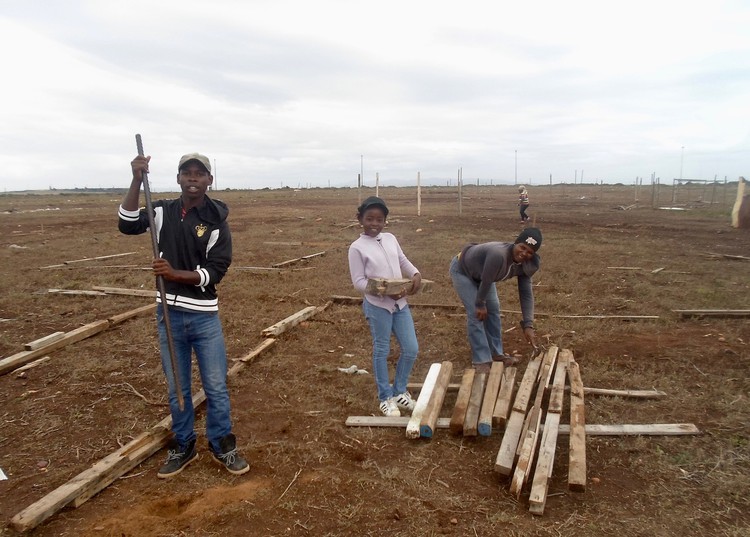School books and uniforms taken by sheriff in shack demolition
“It is becoming difficult to explain our situation to school teachers because this is the third time,” says 15-year-old
On Thursday, residents of Wells Estate, Port Elizabeth, woke at 5am to the sound of bulldozers. When the machinery and Public Order Police had left, more than 200 people in Elephant Park informal settlement were left roofless, their shacks demolished by the sheriff of the court on behalf Nelson Mandela Bay Municipality.
The shack dwellers slept in the open that night in heavy rain. According to them, the land occupation began in December and this was the third demolition since January. Law enforcement officials prevented them from fetching their belongings and valuables in the shacks.
Matshidiso Moseti said, “They ordered us to leave the area with nothing. Even school children were told not to take anything with them. I have two children aged 8 and 11 years old, who failed to go to school because their uniforms and school books were bundled into the sheriff’s trucks.”
Moseti, who is unemployed, grew up in the township of KwaZakhele, Port Elizabeth, which according to Stats SA, based on Census 2011 data, is the worst informal settlement in the country. She said she settled in Elephant Park in December because her landlord had ejected her for failing to pay rent.
“This is the third demolition since January. I have lost property worth more than R10,000 as a result of the demolitions. They took my bed, television set, a table, and all my pots. I have also lost important personal documents as a result of this cruelty by our municipality.”
Coega Primary School learners, 11-year-old Neliswa Kuzwayo and her brother, Mbuyiselo, said they doubted that they would pass their examinations this term.
Mbuyiselo, who is 15, said, “Our parents are unemployed. It is also becoming very expensive to rent accommodation these days. We had hoped that the municipality would develop this area or relocate us to a better place with services. It is also becoming difficulty to explain our situation to school teachers because this is the third time it has been happening. It will take us time to raise money to buy school uniforms and shoes again. Winter is approaching. We also need warm clothing and blankets.”
Siyabonga Madyo is bitter after his bed, paraffin stove and DVD player were loaded on the sheriff’s trucks and taken away.
“We grew up here in Port Elizabeth … I have lost all the building materials and furniture worth R8,000 in the three evictions. I will not give up until I get a house of my own.”
The spokesperson for Executive Mayor Athol Trollip, Sibongile Dimbaza, said, “The settlement in question was erected in December of last year and the recent demolition was carried out by the Sheriff of the Court and was acting on a decision that was taken by the Court. The affected were furnished with court orders to move out of the site as they were there illegally.”
Dimbaza said, “The Human Settlements Directorate has had meetings with the community and will continue to engage with them to put this matter to rest.”
He said the municipal land is earmarked for socio-economic development to benefit the residents of Wells Estate.
Dimbaza said, “Since the demolition was carried out by the Sheriff, people were informed their possessions were carted away for safe keeping and would have to engage the Sheriff to have these released back to their possession.”
The people GroundUp spoke to were not given receipts for their belongings when their shacks were demolished.
Support independent journalism
Donate using Payfast

Don't miss out on the latest news
We respect your privacy, and promise we won't spam you.
Next: Shack fire claims life of 28-year-old
Previous: Sewage “spilling continuously” into Butterworth river
© 2017 GroundUp. 
This article is licensed under a Creative Commons Attribution-NoDerivatives 4.0 International License.
You may republish this article, so long as you credit the authors and GroundUp, and do not change the text. Please include a link back to the original article.

